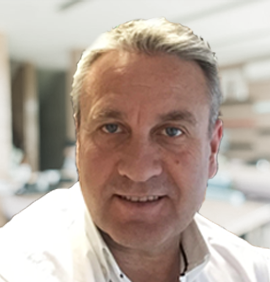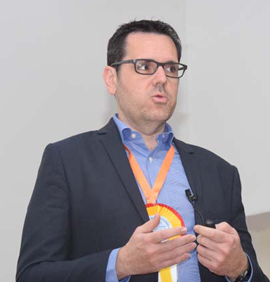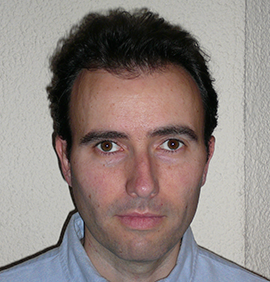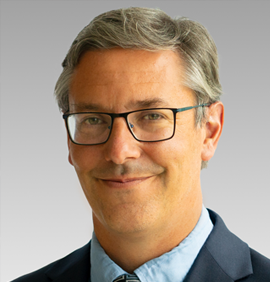 Rey Juan Carlos University
Rey Juan Carlos University David Serrano is Director of the IMDEA Energy Institute and Full Professor of Chemical Engineering at Rey Juan Carlos University. He is also Head of the Thermochemical Processes Unit at IMDEA Energy. Ph.D. received from Complutense University of Madrid (1990) awarded with the Extraordinary Mention. He has been Visiting Associated in the California Institute of Technology (CALTECH, 1991) and in the California University of Santa Barbara (2006). He was appointed as Associate Professor at Complutense University of Madrid (1990-1999), and subsequently at Rey Juan Carlos University. In the latter, he was appointed as Full Professor (2002) and was in charge of different management and academic positions: Coordinator of the Environmental Sciences Area (1999-2001), Vice-rector for Research and Technological Innovation (2001-2002) and Head of the Chemical and Environmental Technology Department (2002-2007). His teaching activity has been focused on subjects related to Chemical Engineering, Environmental Engineering and Energy Engineering in a number of degrees, masters and Ph.D. courses. He has participated in about 73 research projects funded by both public and private institutions, with a significant number of collaborations established with the industrial sector. He has been author of about 230 publications in scientific journals (h =62 and > 11500 citations, according to google scholar). Likewise, he has been author of more than 330 communications to congresses and scientific meetings, of 5 patents and of 4 books. He has been supervisor of 24 Ph.D. theses. He has been member of the Executive Board of the ACENET network (ERA-NET for Applied Catalysis Research in Europe) and of the “Círculo de Innovación en Tecnologías Medioambientales y Energía” (CITME). He is member of the Scientific Committee of CIESOL (Almería, Spain) and of the German Biomass Research Centre (Leipzig, Germany), president of the Spanish Group of Zeolites (GEZ) and member of the Board of Governors of the Spanish Catalysis Society (SECAT) and of the European Federation of Zeolite Associations (FEZA).
 Institut Charles Gerhardt Montpellier
Institut Charles Gerhardt MontpellierGuillaume Maurin, received his PhD in Physical Chemistry from Universite Montpellier 2 (France) in 2001. After a Post-Doctoral Marie Curie Fellowship at the Royal Institution of Great Britain in London (UK) in the group of Pr. C. R. A. Catlow, he became Lecturer in 2002 at the Universite Provence-Marseille (France) and later at the Universite Montpellier 2 where he received his ''Habilitation to Direct Research'' in 2006. He is currently Professor at the Universite Montpellier and at the Institut Universitaire de France. His research interests include the development and applications of advanced molecular simulation techniques to design advanced nanoporous materials for energy and environment-related applications. He is so far the author of more than 300 publications.
 Universitat Politècnica de València
Universitat Politècnica de ValènciaDr. Urbano Díaz (1974) has been working as a CSIC Scientific Researcher at the Institute of Chemical Technology (ITQ) since 2004. He studied Chemical Sciences at the University of Valencia and obtained his doctorate in 2002 in the field of delaminated zeolites in the Polytechnic University of Valencia. He obtained a Marie Curie post-doctoral fellowship developed at EniTecnologie (Eni SpA) in Milan, Italy, working on catalytic applications of hybrid porous materials. In 2004, he returned to ITQ as a Scientist (CSIC), where he continues today, working in the field of multi-functional hybrid materials, lamellar solids, nanocomposites and biomaterials with catalytic and nanotechnological applications. He is the author of more than 75 publications and 11 application patents focused on different aspects of the chemistry of organic and inorganic materials. In addition, he has been principal investigator in regional, national and European projects (7thFP and H2020), as well as guarantor since 2013 of the Severo Ochoa distinction held by the ITQ. In 2010, he was awarded the 6th Idea Prize in New Technologies by the Generalitat Valenciana.
 University of Wisconsin-Madisson
University of Wisconsin-MadissonGeorge Willis Huber is the Richard Antoine Professor of Chemical Engineering at University of Wisconsin-Madison. His research focus is the design of disruptive technologies for the conversion of biomass, waste plastics and other waste resources into renewable fuels and chemicals. He has won several awards including the AICHE Colburn award and the top 100 people in Bioenergy by Biofuels Digest. He has been named a “highly-cited researcher” in the area of Chemistry an award given to the top 1% most cited chemists. He has published over 200 papers, more than 20 patent applications, and received over 40,000 citations. He is co-founder of Anellotech (www.anellotech.com) and Pyran (www.pyranco.com). He is the director of the $12.5 million Center on Chemical Upcycling of Waste Plastics (CUWP) which was funded in 2021. Professor Huber has received visiting professorships from the Chinese Academy of Sciences in 2015 (at Dalian Institute of Chemical Physics), from the Royal Netherlands Academy of Arts and Sciences in 2019-20 and the ExxonMobil Visiting Chair Professor at National University of Singapore in 2019. George did a post-doctoral stay with Avelino Corma at the Technical Chemical Institute at the Polytechnical University of Valencia, Spain (UPV-CSIC). He obtained his Ph.D. in Chemical Engineering from University of Wisconsin-Madison (2005). He obtained his B.S. (1999) and M.S.(2000) degrees in Chemical Engineering from Brigham Young University.
Resumo da palestra: Ethanol is the most abundantly produced liquid fuel derived from biomass and used as a blendstock for gasoline-powered vehicles. It is projected that in the future demand for gasoline will decrease and demand for C8-22 distillate range-fuels such diesel and jet fuels will increase [1]. As we will show in this presentation, ethanol can be converted to higher linear and α-branched alcohols by C-C coupling reactions (ethanol oligomerization) as well as to high molecular weight esters by C-O coupling reactions with Cu/MgxAlOy (CuHT) catalysts. Alcohols may be converted to ethers via bimolecular dehydration in a subsequent step [2]. In this presentation we will study the effect of BET surface area and Cu loading of the CuHT catalysts with Cu loadings up to 1.5wt% on other catalyst properties (active site counts) and on the product selectivity. We have identified more than 160 number of species in the products including alcohols, esters, aldehydes, ketonces, and olefins. Alcohols range from C4 to C10. Both alcohols and esters follow a Schulz-Flory chain growht model. We show the relationship between the catalyst properties (BET surface area, acid and base site count and Cu loading and synthesis method) and the performance in the reactions. We also show that physical mixtures of CuHT and HT can have similar product selectivity of low loading CuHT catalysts. Finally, we demonstrate that diesel fuel precursor (C4+ alcohols, aldehydes and ketones, C6+ esters and ethers) selectivities over 70% can be obtained at all conversion ranges with all the materials with Cu loadings below 0.6wt%, with the selectivity value and the product molecular weights increasing with conversion%.
